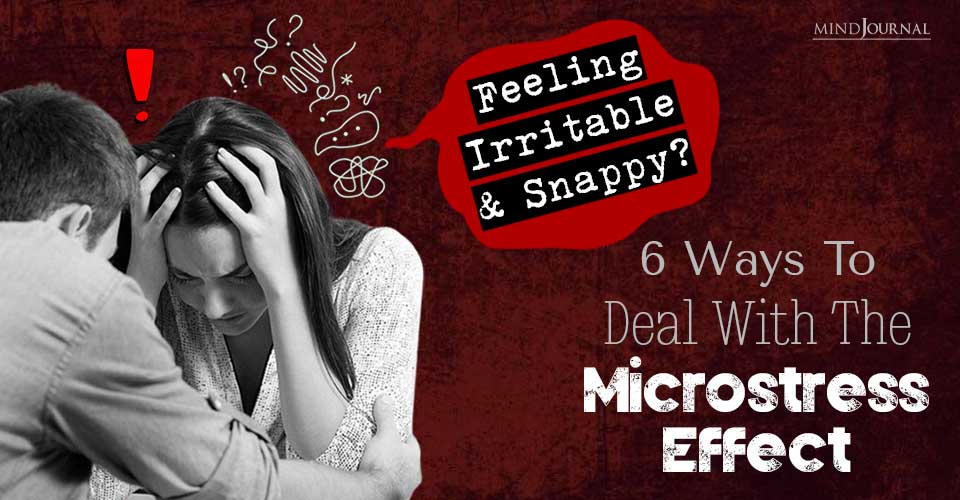I had never heard of microstress until recently, but now I see it everywhere I look. I think a lot of people are struggling with microstress without even knowing it.
I know I was! Stress builds up, and it can be hard to know why. If you have been feeling irritable, tired, and overwhelmed, microstress might be the culprit. Let’s find out how!
Identifying the microstress effect
If you’ve been irritable and snapping at your friends and family, you’re probably experiencing the “microstress effect”.
6-8 hours of sleep was a non-negotiable routine and you always managed to get it done, it’s different now. Recently, you’ve been fidgeting, turning sides in bed, and eventually sleeping way past midnight or wake up feeling tired – then it is one of the microstress examples.
So, without further ado, let’s find out more about this new type of stress in our lives, so that it doesn’t affect your relationships, workspace, and self-confidence.
Microstress are stressors you do not identify as stressful events because you are habituated to them daily. Gradually, these small stressful events pile up and start affecting your life. While you wonder what is happening and why? You remain aloof from the fact that you are facing the microstress effect.
So, if you are going through the same, you can be “microstressed!”
Related: The Photos You Choose Will Tell How Stressed You Are: Quiz
Managing The Microstress Effect

Before trying to manage it, take a quick scan of your daily life and spot the micro stress sources. Let me help you with some everyday microstress examples:
You’ve completed your morning routine, fed the dogs, turned off the lights, checked the gas oven, picked up your keys, and told your parents you’re leaving.
As you’re about to head out for work, your house help casually informs you she won’t be coming today. You drive to work worried, even though you know others at home will manage everything.
At the same time, you have got a project to do, one of your colleagues is giving short responses and avoiding phone calls.
All these are taking place concurrently hence causing mental strain. The fact that you have many things to think about may mean that minor issues will annoy you greatly.
These events are microstress examples. You do not imagine these as stressful events but as small events that have solutions but not straightforward ones.
Now, let’s discuss how to manage the microstress effect.
6 Effective Ways To Manage The Microstress Effect
Managing microstress is not easy as it comes from a different person about subjects that affect the quality of your life. You feel helpless, but you can manage it:
1. Do not entertain passive aggressiveness.
People may get passive-aggressive with you without knowing how it affects you. Do not over-explain and wait for the other person to come and ask valid questions so that you can answer. Otherwise, let people be on their own. Trust me, it is not worth it.
2. Say NO when needed
No is a complete statement. Push boundaries but respectfully. Saying no to requests that work you up, make you over-explain, and overthink is not worth your mental peace and well-being. Say no to colleagues who request you to speak up for them or adjust for them. Prioritize your well-being here.
3. Break tasks and delegate if possible.
After my house help informed me that she would not be coming, I considered it as a possibility. I make arrangements such that even if she fails to come, things will still be ok. You can take this as a “buffer plan.” If you have cooperative family members, you can delegate short tasks to them so that all the burden does not fall on you, the same applies to your workspace.
4. Exercise regularly
A healthy mind resides in a healthy body! Exercise at least 30 minutes a day. The stress built up in your body should have a decent outlet.t instead of venting on others. Exercise helps to regulate the stress inside your body and to let it out.
Related: 5 Of The Best Stress Relief Exercises For A Calm Mind & Body
5. Take 5-minute breaks
I take 10 minutes break instead of 5 minutes. I came across a Japanese philosophy called kaizen, and it worked for me. Taking a 5-10-minute break and maintaining 30-40 minutes of focused work increased my productivity and did not build any stress in me. I prefer reading an interesting book at that time. Reading books is an effective way to reduce stress.

6. Positive self-talk
If you know the power of autosuggestion, you know how wonderful this may work! Invest more time reminding yourself of your capabilities and how far you have come.
Remind yourself that there are many things apart from your work and responsibilities to others, that nourish you and help you grow.
Related: Unveiling the Impact of Microstress on Mental Health: Strategies for Coping
Final thoughts
Your curiosity about your behavioral changes is the only thing that can help you. Although a lot of people do not take themselves seriously, you can overcome any problem in life by being observant of yourself. T
o begin with, rather than giving excuses and justifications, you must face the truth head on. In case you are currently experiencing it, my wish is that this will assist you in dealing with microstress effect.
Frequently Asked Questions –
How to deal with microstress effect?
Learn to say no, push your boundaries and avoid routine negative interactions
What is the meaning of microstress?
Microstresses are short stressful events on a daily basis that you fail to recognize as stress
What is microstress burnout?
When these little stressful events pile up, you feel drained, irritated and helpless. This is called microstress burnout.










Leave a Reply